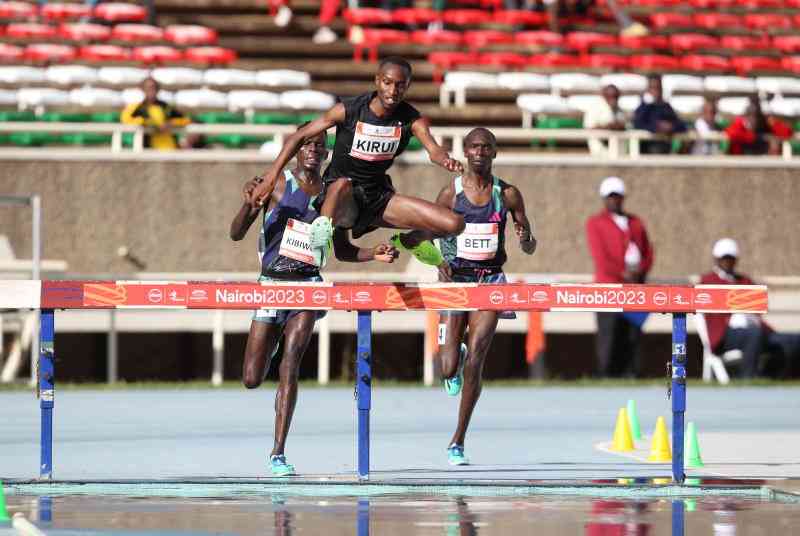 |
|
Materi Girls Principal Sebastian Mbae with students at the flower bedecked fresh grave of the late Bro. John in the school compound |
Touch times go away. Touch people don’t’ are the words stenciled in white on the wall in Bro John Koczka’s office at Materi Girls’ Centre, Tharaka Nithi County, and they cannot escape the notice of an inquisitive mind. They are simply hypnotising.
Why? Bro John is physically gone and the evidence is there in the form of a simple concrete tomb in the compound of the school he helped found, nurtured for 41 years and loved. But what he touched — the girls and women he held and helped become successful through education — lives on.
The brother ensured Materi Girls’ Centre was run without ‘stipulated written rules’.
The deputy chairperson of the school’s alumnae Edna Kendi who left in 2002, recalls that rules in the form of letters or notices on boards as happens elsewhere were nonexistent, because students were expected to automatically conform to the prevailing culture.
“We had no timetables, for instance. It was assumed that common sense was sufficient for one to toe the line that others were following. No one would tell you that morning prayers at 5am were mandatory or that prep time fell within particular hours. There were no rules to be broken.”
The school’s rewarding system for excellence in class work was different from what most schools do. Those who took positions one to five in their classes for three consecutive terms qualified automatically for scholarships that ran into their remaining academic years, but would be withdrawn without notice if they relapsed.
“Once you came to Materi Girls’, no one pushed you around as to what you should do because it was assumed that everyone was responsible enough to do the right thing,” says Kendi. Unlike other schools at the time, bullying was foreign at Materi.
The school’s principal of three decades, Sebastian Mbae, confirms the absence of written rules at the school. “What we have are guidelines, not written rules as you know them. We have a school culture that all students are expected to shape up to or ship out if they prove totally incongruent,” says Mr Mbae.
Family culture
The principal says it pays to show human beings that they are responsible instead of watching over them like sheep. “It has worked for Materi as we have never had a recorded strike or school uprising all these years,” he says.
Mbae attributes the school’s academic success in a difficult terrain to the family culture assiduously cultivated over the years.
“Here, every teacher plays either father or mother to the girls with the responsibility of instilling the right character and discipline in students. Twelve of the 32 academic staff members are trained counsellors in various aspects of adolescent behaviour,” he says.
The school’s head girl, 17-year-old Yvonne Kagwiria says the love and adoration showered on the girls plays a role in ensuring that they do not stray from the expected norm.
“The seed was sown by Bro John who went out of his way to provide nail polish for our nails, lip stick, earrings and bangles to enhance our beauty. We paid a token for it while those from disadvantaged backgrounds had free helpings. Where else does that happen? Small things such as sodas and biscuits on Valentine’s Day count in winning the loyalty of girls. We feel loved and wanted during our sojourn here,” she says.
Materi in Kimeru means ‘dust’. And what a fitting name it is for such a dusty setting transformed into an oasis of exquisiteness by towering trees and lush grass. The school, co-founded in 1973 by Bro John, an American educator from the Sacred Heart Brothers and Father Andrew Botta, a dynamic Consolata missionary, is surrounded by a dry jungle where the sun burns fiercely at the foot of Mount Kenya.
Stay informed. Subscribe to our newsletter
“This issue of nail varnish and other embellishments for students, is it true?” I ask Mbae, an avuncular administrator who has headed the school for an incredible 32 years.
“Yes,” he says with a smile. “I had qualms approving of the make-up. I regarded it as a waste of resources, but I took refuge in the large silhouette of Bro John whenever other head teachers became curious at inter-school events. But I knew that we were unique and did not split hairs over it because our girls were smarter in their outlook and academics as well. It is alright so long as it is not overdone. As the saying goes, anything in excess is a poison.
“You should have seen the girls whenever Bro John arrived with these things. Frankly, I would avoid his office. Shall we sustain it? It is a question I am sure the girls must be asking. My assurance is that the school’s culture will remain intact in spite of the passing of our founder. We shall uphold all that guarantees a smooth continuity. His legacy shall never die.
Rare breed
After a pause, he says: “Bro John belonged to that rare breed of parents who believe in giving everything to their children to the extent of denying themselves earthly comfort. It was normal to see him in shoes torn at the soles, his socks squidgy with water during the rains. He didn’t feel discomfort when it came to the girls and his staff.”
But the school’s uniqueness benefited Mbae. Mbae’s promotion to principal was dramatic, coming just one and a half years into his graduation with a Bachelor of Education degree from Kenyatta University where he majored in mathematics and physics. He reminisces: “Bro John must have seen something rare in me. But I was hesitant. I asked for two weeks to ‘think it over’. I reluctantly accepted to try and the rest is history. I have never been to any other school, since.”
Mbae has five children, but he and his wife regard the 780 girls in the school their daughters.
This culture without rules, how does it relate to sound discipline?
“The school has cultivated an atmosphere where the administration and teachers are close to the students, an ingredient that dissolves discontent. Being open and creating a free atmosphere where grievances are aired without hindrance or fear of victimisation at all levels helps. Dialogue must be encouraged at all times. We have done that here,” Mr Mbae says with a grin.
The team of teachers with motherly and fatherly attributes helps the students solve most problems not related to school work.
As an afterthought, Mbae says: “I know you must be asking ‘why a male principal?’. To me, girls are just like boys but for the fact that they are feminine.
“Their problems including adolescence are the same. This idea that girls’ schools must be headed by women and vice versa is nothing but a stereotype. What really matters is the personality and status of the man or woman in charge.”
Head girl Kagwiria and her deputy Vivian Nkirote concur. Out of the principal’s earshot, Kagwiria confides: “Mr Mbae knows how to handle the girls. We are sincerely proud of him”.
 The Standard Group Plc is a
multi-media organization with investments in media platforms spanning newspaper
print operations, television, radio broadcasting, digital and online services. The
Standard Group is recognized as a leading multi-media house in Kenya with a key
influence in matters of national and international interest.
The Standard Group Plc is a
multi-media organization with investments in media platforms spanning newspaper
print operations, television, radio broadcasting, digital and online services. The
Standard Group is recognized as a leading multi-media house in Kenya with a key
influence in matters of national and international interest.
 The Standard Group Plc is a
multi-media organization with investments in media platforms spanning newspaper
print operations, television, radio broadcasting, digital and online services. The
Standard Group is recognized as a leading multi-media house in Kenya with a key
influence in matters of national and international interest.
The Standard Group Plc is a
multi-media organization with investments in media platforms spanning newspaper
print operations, television, radio broadcasting, digital and online services. The
Standard Group is recognized as a leading multi-media house in Kenya with a key
influence in matters of national and international interest.








